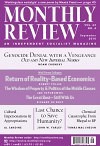Volume 62, Issue 04 (September)

During the period stretching from the 1970s through the 1990s, Monthly Review, under the editorship of Harry Magdoff and Paul Sweezy, stood apart in its analysis of the tendency to economic stagnation in advanced capitalism and its view that the economic slowdown beginning in the 1970s was a manifestation of this secular tendency. The financial explosion that also emerged in these years was seen as an attempt by the system to stave off stagnation by means of credit-debt expansion, but at the cost of increasing financial fragility | more…
Over the past generation, the U.S. economy as well as most of the rest of the global economy have been dominated by the idea that free market capitalism produces dynamic growth, financial stability, and as close as we are likely to come to a fair society. Supporters of this pro-market framework hold that government interventions to encourage growth, stability, or even fairness will almost always produce more harm than good. This mode of thinking has been the intellectual foundation for the era of financial deregulation in the United States—the dismantling of the Glass-Steagall regulatory system that was built amid the rubble of the 1929 stock market crash and ensuing 1930s Depression. The Clinton administration provided the final nails in the coffin of financial regulation with the passage of the Financial Services Modernization Act in 1999 | more…
At the end of the twentieth century, while financial economists satisfied their intellectual pretensions to useful knowledge by conjuring up visions of a world peopled with materialistic consumer-investors optimizing rationally in accordance with their willingness to hazard their wealth, the propertied classes themselves were succumbing to new delusions fostered by the financial markets. The reasoned response of propertied individuals to their experience of the world of speculative finance has created a new political culture with important consequences for the political economy of capitalism | more…
Perhaps the most shattering lesson from [the] powerful inquiry [of Edward S. Herman and David Peterson in The Politics of Genocide] is that the end of the Cold War opened the way to an era of virtual Holocaust denial. As the authors put it, more temperately, “During the past several decades, the word ‘genocide’ has increased in frequency of use and recklessness of application, so much so that the crime of the 20th Century for which the term originally was coined often appears debased.” Current usage, they show, is an insult to the memory of victims of the Nazis | more…
Twenty-five years ago, a runaway chemical reaction in a tank at a Union Carbide (UC) pesticide factory created a poisonous gas which, unimpeded by the factory’s safety devices, spewed out over the sleeping population of the Indian city of Bhopal. Amnesty International estimated that seven thousand to ten thousand died in the catastrophe’s first three days, and that, by 2004, another fifteen thousand died. Prior to Bhopal, concern over toxic chemicals was confined to long-term or chronic effects on human health and the environment. Bhopal, however, showed that the manufacture, storage, and use of toxic chemicals also posed a major, acute risk to the safety of those working in and living around petrochemical plants and complexes | more…
Growing up on a Midwestern farm while Marx worked on the final draft of Capital, Vol. I, was a boy who, as a man, would have a very different take on the relationship of workers to the products of their labor. Thorstein Veblen would become famous for what he wrote about the fetishized commodities of consumers.…For Veblen, all the nonessentials that we purchase as consumers reflect standards of respectability established by the upper class. The “motive that lies at the root of ownership is emulation,” he wrote, not just of others but of wealthy and powerful others. Under capitalism, one’s property “becomes the conventional basis of esteem,” by which Veblen meant both the high regard of others and self-esteem.…Over the past few decades, however, standards for personal appearance have been transformed in ways that seem to turn Veblen’s conspicuous consumption idea inside out | more…
Marge Piercy (www.margepiercy.com) is the author of seventeen novels, most recently Sex Wars; seventeen volumes of poetry, most recently The Crooked Inheritance; a memoir, Sleeping with Cats; and two nonfiction books. Knopf will publish her second volume of selected poems, The Hunger Moon: Selected Poems, 1980-2010, next March | more…
James Hansen, Storms of My Grandchildren: The Truth About the Coming Climate Catastrophe and Our Last Chance to Save Humanity (New York: Bloomsbury Press, 2009), 320 pages, $25.00, hardcover.
James Hansen, one of the world’s most distinguished climate scientists, has written an important book about the threat posed by climate change. The title, Storms of My Grandchildren, refers to the prediction of more powerful and more damaging storms in a warmer, future earth. Subtitled The Truth About the Coming Climate Catastrophe and Our Last Chance to Save Humanity, the book is written for a lay public and is certain to be controversial | more…
Michael Perelman, The Confiscation of American Prosperity. From Right-Wing Extremism and Economic Ideology to the Next Great Depression (New York: Palgrave Macmillan, 2007), 239 pages, $30.00 hardcover.
Yves Smith, Econned: How Unenlightened Self Interest Undermined Democracy and Corrupted Capitalism (New York: Palgrave Macmillan, 2010), 362 pages, $30 hardcover.
Some forty years ago, the American business empire viewed itself as under siege as a result of government interventions threatening its freedom of action, demands for annual wage increases in the face of declining corporate profitability, import penetration of its home markets, as well as by loss of global hegemony symbolized by defeat in Vietnam. The empire struck back. A conglomerate of right-wing forces proceeded to declare war on the social reforms and institutions that had taken shape since the 1930s under the wing of an expanding federal government | more…
